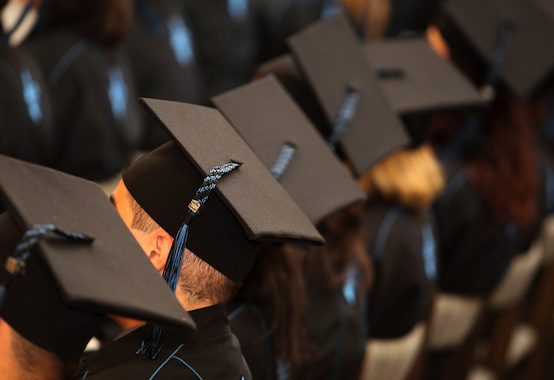When College Goes Club Med

I belong to a generation that still values what is now indiscriminately referred to as “higher education.” What that once meant was going to a four-year college, if one’s high-school grades showed promise, and in return for about $700 each semester spending the next four years immersed in books. Back then we studied traditional disciplines, such as math, languages, and those liberal arts that still defined our Western civilization. If a bright student wanted to branch out to other cultures and languages, like Chinese or Japanese, he or she was encouraged to do so. Unlike some colleges nowadays, we most certainly did not have “hands-on learning.” The prevalent view was that if students didn’t want to read books, they shouldn’t be in college.
Not insignificantly, we lived like medieval monks. We had next to no control about what was served in the dining room; and watching TV in the evening was only possible if one shared this amenity with other adolescents in some far-off corner of the campus. We were in college strictly to learn, with few learning devices. We were definitely not there to hang out, play video games in our dorm rooms, or choose from multiple culinary options in an eating area that looked like the circular dining room in the Hotel Hershey.
I used to get dirty looks toward the end of my teaching career when I asked students in Western Civilization courses what books they had read. These students didn’t open books, perhaps on principle. I’ve no idea why they’re in college, except to meet significant others and to enjoy leisure time at the expense of their parents or of American taxpayers. As I like to point out, such college residents are students in the same sense I would be a player in the national hockey league, if I signed up in a program that allowed me to imagine I was something I was not. Of course, since these kids, or their enablers, are paying at least one hundred times more than I did for my education, they get their illusions and sybaritic tastes indulged.
Lest I forget, let me mention that the number of administrators I recall seeing at Yale University in the mid-1960s was a fraction of the army of paper-pushers that is there now. I suspect these paper-pushers are now earning salaries that correspond to the tuition that Yale requires from each undergraduate, which is $58,000 a year. Although this money is icing on the cake, since most Ivy League and at least some state universities could survive from their endowments, Yale and schools of similar caliber do provide enormous professional advantages to their graduates. I’m not sure what comparable advantages accrue to those who attend considerably less prestigious institutions of learning and are paying almost as much for the experience.
This excursion down memory lane brings me to my final point, the complaint that is coming from the Pennsylvania university system that Governor Corbett is not giving “educators” enough dough. Originally Corbett tried to withdraw between 20 and 30 percent of their state funding but then chickened out. If were in his place, I would have urged PSU to dump as many administrators as it could. Do we really need officials to represent “diversity” or other real or alleged social problems on more than 20 campuses across the state? And the salary of over $500,000 a year that is going to the current president of PSU should be causing us to blush in shame, even if that is only half as much as his predecessor earned. Salary reduction for college administrators is dictated by decency as well as thrift. If these bureaucrats wish to live like corporate executives, then they should find jobs into the private sector. At least they won’t be taking my money.
It would also be a good idea if these state behemoths started to budget a bit more reasonably. Do the customers really need so many leisure activities, exercise rooms, computer and video paraphernalia in order to attend a relatively inexpensive state school? If state universities are interested in maximizing their competitive advantages, then they should offer fewer frills and charge less. Americans would do well to look at European universities to see how much less luxuriously students are treated there. Exchange students I’ve met are astonished at how lavishly our college students live. And having spent time on foreign campuses, I know these visitors are right. American colleges are becoming resorts that offer what are increasingly devalued degrees, often in majors that should not even exist. And these resorts are top-heavy. Like our costly public schools, colleges and universities are smothered in administration. Corbett should be raising these issues, as he listens to the complaints coming from “higher education.”
Paul Gottfried is the author, most recently, of Leo Strauss and the Conservative Movement in America: A Critical Appraisal.
Comments